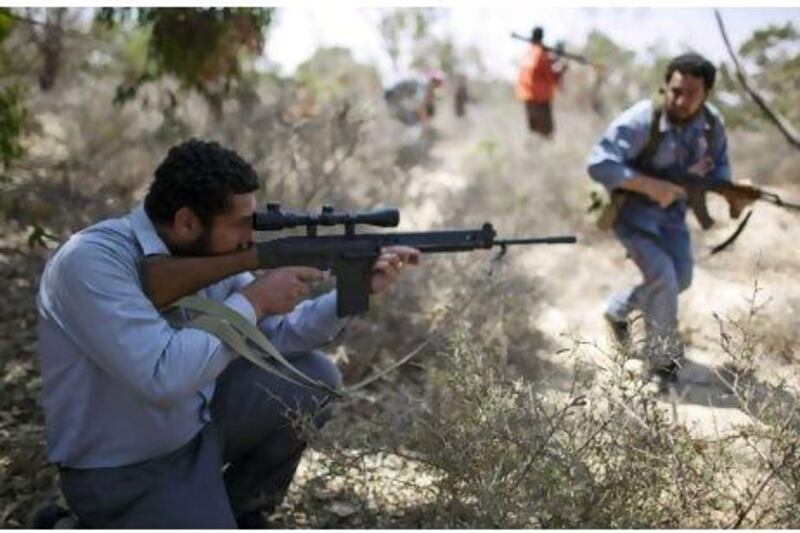MISURATA // Forces loyal to the Libyan leader Colonel Muammar Qaddafi bombarded the rebel-held city of Misurata with mortars yesterday, as the United States said a fresh ceasefire offer from the Libyan leader's government was not credible.
The bombardment of Misurata was the heaviest for days and came as western leaders, gathering for a Group of Eight summit in the French seaside resort of Deauville, were expected to reiterate their determination to force Colonel Qaddafi out.
Rebel spokesmen in Misurata, the scene of some of the fiercest fighting in Libya's three-month-old conflict, said the mortar attack killed three rebels.
Spain said it was one of several foreign states contacted by the Libyan prime minister, al Baghdadi Ali al Mahmoudi, with an offer of an immediate ceasefire.
But the White House deputy national security adviser, Ben Rhodes, speaking in Deauville, said the United States did not see the new Libyan ceasefire offer as credible because it was not accompanied by action.
Libya was not complying with UN demands and its forces were still attacking population centres, so the United States would continue with the military campaign, he told reporters.
At a news conference in Tripoli, Mr al Mahmoudi said the offer was based on an existing African Union "road map" to resolve the conflict, which does not include any mention of Colonbel Qaddafi's own future - a crucial sticking point. "Libya is serious about a ceasefire," he said.
The rebels said they wanted any government initiative to include the Libyan leader's departure as a first step.
Mustafa Abdel Jalil, the head of the rebel Transitional National Council, said on Al Jazeera television: "We welcome any initiative which starts with the departure of Qaddafi, his sons and his regime from Libya."
Earlier yesterday African leaders gathered at a Libya-focused summit in the Ethiopian capital Addis Ababa called for an end to Nato air strikes to pave the way for a political solution conflict.
Colonel Qaddafi's security forces cracked down ferociously when thousands of Libyans rebelled against his rule. Nato missiles and warplanes have been bombing targets in Libya for two months under a UN mandate to protect civilians from attack.
Rebels now control the east of the country, around their main stronghold of Benghazi, and pockets of land in the west.
But the conflict has reached stalemate on the ground, with the rebels unable to advance towards Tripoli and Nato powers, wary of getting sucked into new conflicts after their experience in Iraq and Afghanistan, refusing to put troops on the ground.
Nevertheless, western officials say they are confident that they are gradually loosening Col Qaddafi's grip on power through a combination of sanctions and military and diplomatic pressure.
"You are wearing down a regime over time," said a defence official. "You make the elites feel uncomfortable; you get dissension in the upper ranks. It doesn't happen quickly."
"What you are trying to do is get the regime to read the writing on the wall," the official said.
Britain's defence ministry said its Typhoon and Tornado aircraft had used Paveway guided bombs to attack a military vehicle depot at Tiji, in western Libya, which was being used to support attacks on the rebel-held western mountain region.
Colonel Qaddafi denies his troops target civilians and says his security forces were forced to act to put down a rebellion by criminals and members of al Qa'eda.
Anxious to break the stalemate, some western powers are pressing for Nato to intensify its operations. France has said it will deploy attack helicopters, which are better able to pick out targets on the ground than high-altitude aircraft.
* Reuters with additional reporting by Agence France-Presse





